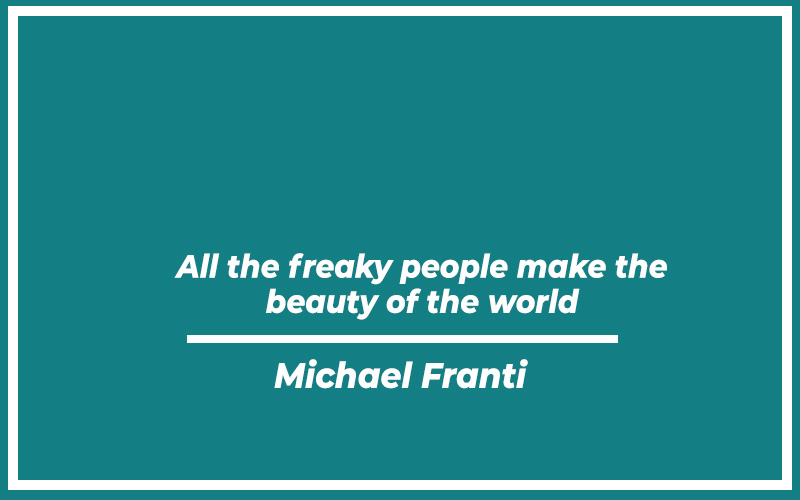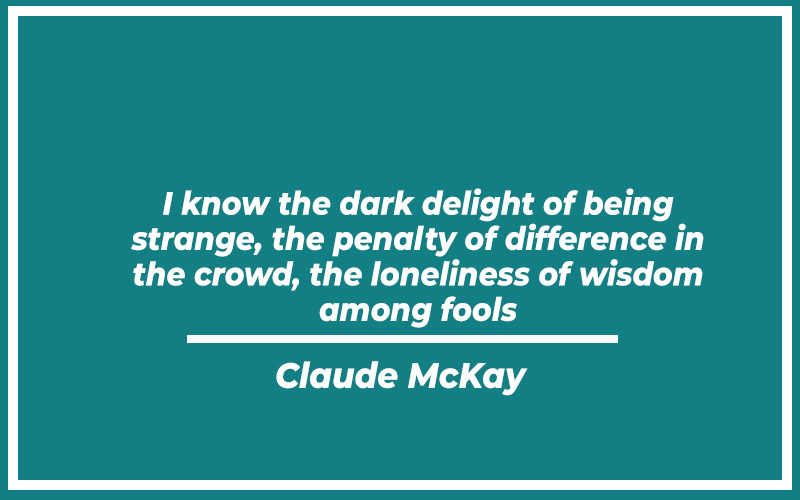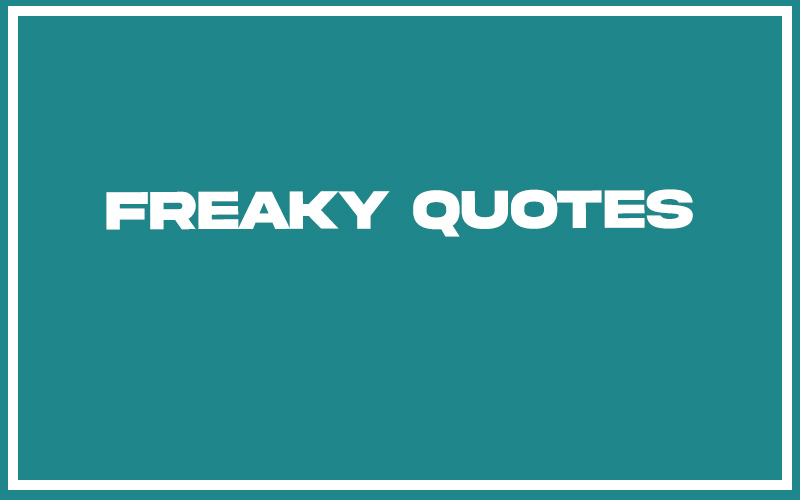Have you ever come across a quote that makes you stop in your tracks, raises the hairs on your arms, or makes you laugh nervously at how strange yet relatable it is?
Those are freaky quotes—words that dive into the weird, the unconventional, and sometimes the downright unsettling aspects of life.
They tap into the parts of you that feel a little different, a little rebellious, or maybe just misunderstood. Freaky quotes aren’t just about being odd; they’re about celebrating uniqueness, challenging norms, and reminding you that it’s okay—awesome, even—to embrace the freaky side of yourself.
Best Freaky Quotes

“All the freaky people make the beauty of the world.” – Michael Franti
This quote celebrates the diversity and uniqueness that unconventional individuals bring to society. By embracing those who deviate from the norm, we enrich our collective experience with varied perspectives and creativity. Franti suggests that it’s the so-called “freaky” people who add depth and color to the world, challenging societal norms and encouraging progress. Their distinctiveness contributes to the world’s beauty, reminding us to appreciate and value differences rather than conforming to a singular standard.
Also Read: Top Don’t Lie To Me Quotes (with Explanation)
“I’m one of those freaky people that actually reads books.” – Jason Momoa
Momoa’s statement highlights the unfortunate rarity of reading in contemporary culture. Describing himself as “freaky” for enjoying books underscores how intellectual pursuits can be viewed as unconventional. This reflects a societal shift where digital media often overshadows traditional reading. Momoa’s pride in his reading habit challenges this trend, advocating for the value of literature and continuous learning. His comment serves as a reminder of the importance of intellectual engagement, even if it seems out of the ordinary.
“Fear is the freaky troll under the bridge that leads to achievement.” – Richie Norton
Norton personifies fear as a “freaky troll,” emphasizing it as an obstacle on the path to success. This metaphor suggests that confronting and overcoming fear is essential for personal growth and achievement. By facing our fears, we can cross the “bridge” toward our goals. Norton’s imagery encourages individuals to view fear not as a deterrent but as a challenge to be met, reinforcing the idea that overcoming fear is integral to reaching one’s full potential.
“You say freak, I say unique.” – Christian Baloga
Baloga’s quote challenges the negative connotations associated with the term “freak.” By equating “freak” with “unique,” he emphasizes that what some may perceive as odd or abnormal is simply individuality. This perspective encourages acceptance and celebration of personal differences, promoting a more inclusive society. Baloga’s assertion invites us to reconsider our judgments and recognize the value in uniqueness, fostering a culture that honors diversity.
“I love watching a good, freaky horror movie. I love it.” – Yvonne Strahovski
Strahovski’s enjoyment of “freaky” horror films highlights the human fascination with fear and the unknown. Engaging with horror allows individuals to explore their anxieties in a controlled environment, providing both thrill and catharsis. This interest in the macabre reflects a desire to confront and understand fear, suggesting that such experiences can be both entertaining and psychologically beneficial. Strahovski’s admission underscores the complex relationship between fear and enjoyment in human psychology.
“I do believe in ghosts. Freaky things will happen, and I’m like, ‘The wind didn’t do that! Some spirit did’.” – Devon Werkheiser
Werkheiser’s belief in ghosts and attribution of unexplained events to spirits reflects a common human tendency to seek supernatural explanations for mysterious occurrences. This perspective highlights the interplay between cultural beliefs and personal experiences in shaping one’s understanding of reality. Werkheiser’s openness to supernatural interpretations underscores the enduring presence of paranormal beliefs in modern society, illustrating how such views can influence perceptions of everyday events.
“In school the kids thought I was freaky because I made straight A’s and daydreamed a lot.” – Shelley Duvall
Duvall’s reflection on being perceived as “freaky” for academic excellence and imagination sheds light on societal attitudes toward intelligence and creativity. Her experience suggests that deviation from the norm, even in positive ways, can lead to social alienation. Duvall’s account emphasizes the importance of fostering environments that celebrate academic and creative achievements, encouraging individuals to embrace their talents without fear of being ostracized. It serves as a reminder to support and uplift those who excel in unique ways.
I’m proud to be a freak of nature.” – Robin Brande
Brande’s declaration embraces the concept of being a “freak of nature,” turning what is often considered an insult into a badge of honor. By expressing pride in her uniqueness, she challenges societal norms that label deviations from the standard as negative. This perspective encourages individuals to celebrate their distinct qualities and reject the pressure to conform. Brande’s statement serves as a powerful reminder that embracing one’s true self, even if it defies conventional expectations, is a source of strength and authenticity.
“Freaks are the much-needed escape from the humdrum. They are poetry.” – Albert Perry
Perry’s quote elevates “freaks” as essential elements that break the monotony of everyday life, likening them to poetry. This comparison suggests that those who are different bring beauty and depth to the world, offering fresh perspectives that challenge the mundane. By valuing the unconventional, Perry highlights the importance of diversity in thought and expression, implying that without such “freaks,” society would lack vibrancy and creativity. This viewpoint advocates for the appreciation of individuality as a vital component of cultural richness.
“We have to dare to be ourselves, however frightening or strange that self may prove to be.” – May Sarton
Sarton’s assertion underscores the courage required to embrace one’s true identity, even when it appears frightening or strange. This perspective acknowledges the internal and external challenges individuals face when deviating from societal expectations. By daring to be authentic, people can achieve personal fulfillment and contribute genuinely to the world. Sarton’s words serve as an encouragement to overcome fear and societal pressure, advocating for self-acceptance and the celebration of one’s unique essence.
“I don’t judge others. I say if you feel good with what you’re doing, let your freak flag fly.” – Sarah Jessica Parker
Parker’s statement promotes non-judgmental acceptance and encourages individuals to express their true selves without inhibition. The phrase “let your freak flag fly” suggests proudly displaying one’s uniqueness. By endorsing this freedom of expression, Parker advocates for a society where diversity is celebrated, and individuals are not constrained by conventional norms. Her perspective fosters an environment of inclusivity and personal freedom, where authenticity is valued over conformity.
“Most people go through life dreading they’ll have a traumatic experience. Freaks were born with their trauma. They’ve already passed their test in life. They’re aristocrats.” – Diane Arbus
Arbus’s observation offers a profound insight into the lives of those considered “freaks,” suggesting that their inherent differences serve as a form of pre-existing trauma. By stating they’ve “already passed their test in life,” she implies that these individuals possess a unique resilience and depth of experience. Labeling them as “aristocrats” elevates their status, recognizing the strength and authenticity that come from embracing one’s true self despite societal challenges. Arbus’s perspective invites a reevaluation of societal norms and the value placed on conformity.
“I’m not going to change the way I look or the way I feel to conform to anything. I’ve always been a freak. So I’ve been a freak all my life and I have to live with that, you know. I’m one of those people.” – John Lennon
Lennon’s declaration of steadfast self-acceptance highlights his refusal to conform to societal expectations. By embracing the label of “freak,” he challenges the negative connotations associated with nonconformity. Lennon’s commitment to authenticity serves as an inspiration for others to remain true to themselves, regardless of external pressures. His perspective underscores the importance of individuality in a world that often values uniformity, encouraging a celebration of personal uniqueness.
“I love being a freak. It’s great!” – Brian Molko
Molko’s enthusiastic embrace of being a “freak” reflects a positive reclamation of a term typically used derogatorily. By expressing love for his uniqueness, he challenges societal norms that stigmatize deviation from the mainstream. Molko’s perspective encourages others to find joy in their individuality and to reject the notion that being different is undesirable. His statement serves as a celebration of diversity and a call to embrace one’s true self with pride and happiness.
I have crazy claustrophobic dreams, weird elevator dreams where the elevator closes in and all of a sudden I am lying down—oh my God, it’s a casket. Just freaky stuff like that.” – Dave Grohl
Grohl’s vivid description of his claustrophobic dreams highlights the profound impact of subconscious fears on our psyche. Such dreams often symbolize feelings of entrapment or anxiety in one’s waking life. By sharing these experiences, Grohl normalizes the discussion around personal anxieties and the manifestations they can have during sleep. This openness encourages others to acknowledge and address their own fears, fostering a greater understanding of the human experience and the complexities of our subconscious minds.
“People think that I must be a very strange person. This is not correct. I have the heart of a small boy. It is in a glass jar on my desk.” – Stephen King
King’s macabre humor reflects his unique perspective as a master of horror fiction. By juxtaposing innocence with a gruesome image, he challenges societal norms and invites readers to confront their discomfort with the bizarre. This approach not only entertains but also provokes thought about the boundaries of normalcy and the allure of the grotesque. King’s ability to blend the ordinary with the eerie compels us to explore the darker facets of human nature and our fascination with the uncanny.
“When you’re born you get a ticket to the freak show. When you’re born in America, you get a front row seat.” – George Carlin
George Carlin‘s satirical observation critiques societal absurdities, particularly within American culture. By likening life to a “freak show,” he underscores the spectacle of human behavior and societal contradictions. This perspective encourages critical reflection on cultural norms and the often bizarre nature of societal constructs. Carlin’s humor serves as a mirror, prompting us to question and analyze the peculiarities of the world we inhabit and our roles within it.
“I always felt like I was a freak when I was growing up and that there was something wrong with me because I couldn’t fit in anywhere.” – Madonna Ciccone
Madonna’s candid reflection on her feelings of alienation during her youth resonates with many who have experienced similar struggles. Her journey from feeling like an outsider to becoming an influential cultural icon exemplifies the power of embracing one’s uniqueness. This narrative inspires individuals to find strength in their differences and to pursue their passions despite societal pressures to conform. Madonna’s story serves as a testament to the transformative power of self-acceptance and authenticity.
“I think every writer has a little freak in ’em.” – A.D. Posey
Posey’s assertion highlights the inherent eccentricity often found in creative individuals. Writers, in particular, delve into diverse perspectives and imaginary worlds, necessitating a departure from conventional thinking. This “freak” aspect fuels creativity and innovation, allowing writers to explore uncharted territories of human experience. Posey’s comment celebrates this unconventionality as a vital component of artistic expression, encouraging writers to embrace their unique viewpoints and the richness they bring to literature.
“I love everything about you, but your wild side is my favorite.” – Unknown
This quote celebrates the allure of embracing one’s untamed and unconventional traits. It suggests that authenticity and spontaneity are not only attractive but also essential for deep, meaningful connections. By valuing the “wild side,” it encourages individuals to express their true selves without fear of judgment. This perspective fosters genuine relationships built on acceptance and appreciation of each other’s unique qualities, highlighting the beauty found in embracing the full spectrum of one’s personality.

“I know the dark delight of being strange, the penalty of difference in the crowd, the loneliness of wisdom among fools.” – Claude McKay
McKay’s poignant reflection captures the isolation that often accompanies nonconformity and intellectual insight. The “dark delight” refers to the bittersweet experience of embracing one’s uniqueness amidst societal pressure to conform. This acknowledgment of the “penalty of difference” and the “loneliness of wisdom” speaks to the challenges faced by those who deviate from the norm. McKay’s words serve as a testament to the resilience required to maintain one’s individuality and the profound, albeit solitary, fulfillment it can bring.
Also Read: top The Drama Quotes (with Explanation)
Final Thought
So, what do freaky quotes really teach you? They remind you to embrace the quirks, the oddities, and the unconventional pieces that make you, you. Life’s too short to fit into a box, and these quotes challenge you to think differently, laugh at the absurd, and even find beauty in the strange.
Next time you stumble across something freaky, whether it’s a thought, a feeling, or a quote, let it inspire you. Let it be a nudge to celebrate the weirdness within and around you—because that’s where the real magic happens. Stay freaky, stay you!

